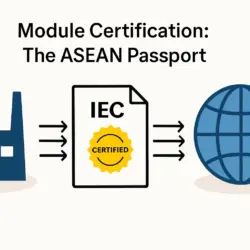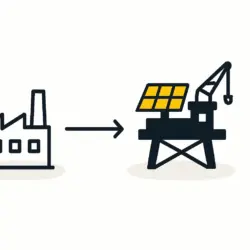Brunei’s Ministry of Primary Resources and Tourism (MPRT) has officially launched the nation’s first large-scale solar-powered shrimp farm, a landmark initiative announced at the recent Brunei Business Conference 2025. This pioneering project represents a significant leap forward for the country’s aquaculture industry, blending traditional farming with cutting-edge renewable energy. The venture is a strategic collaboration between MPRT and the private sector, designed to substantially boost shrimp production and steer the country towards greater food self-sufficiency.
First Shrimp Farm to Use Brunei solar shrimp farm Energy
The groundbreaking shrimp farm, situated in Kampong Sungai Paku, is operated by Marine Culture Technologies (MCT). Spanning an impressive 25 hectares, it stands as the first aquaculture facility in Brunei to be powered entirely by solar energy. The farm’s infrastructure includes 40 ponds, each with the capacity to produce 20 metric tonnes of shrimp per cycle. With two cycles planned annually, this translates to a remarkable production capacity of 1,600 metric tonnes per year.
The integration of a dedicated solar power system is a game-changer for the farm’s operations and environmental impact. This clean energy source powers essential equipment like water pumps and aeration systems, which are critical for maintaining optimal pond conditions. Understanding the basics of solar panel manufacturing reveals how this technology efficiently converts sunlight into reliable electricity. By adopting renewable energy, the farm significantly reduces its carbon footprint and operational reliance on fossil fuels, aligning perfectly with Brunei’s national sustainability goals. This project not only showcases a commitment to green energy but also sets a powerful precedent for future aquaculture developments in the region.
Boosting Shrimp Production in Brunei solar shrimp farm
Building on this momentum, MPRT has also unveiled plans to expand shrimp farming projects in other strategic locations. These initiatives include a new 20-hectare farm in Kampong Sungai Penyatang, to be developed by Golden Corporation Sdn Bhd, and another 40-hectare site in Kampong Sungai Sembatang, also managed by MCT.
This strategic expansion is a core component of Brunei’s broader vision to fortify its domestic food production and lessen its dependence on seafood imports. Currently, a significant portion of the nation’s seafood is sourced from abroad. By scaling up local shrimp production, Brunei is taking decisive steps toward achieving self-sufficiency and building a more resilient and competitive aquaculture sector.
Shrimp Processing Facility to Enhance Value Chain in Brunei solar shrimp farm
To complement the growth in production, MPRT has announced its intention to establish a dedicated shrimp processing facility in the coming years. This facility will be a vital link in the shrimp value chain, enabling the processing, packaging, and preparation of shrimp products for both domestic consumption and international export.
The development of this processing plant is expected to generate new employment opportunities and stimulate further economic growth. By adding value locally, Brunei can move beyond simply exporting raw products. This move will enhance the competitiveness of its seafood exports and solidify the country’s reputation as a reliable supplier of high-quality, sustainably produced shrimp. The investment required for such facilities is considerable, mirroring the detailed planning seen in a solar panel manufacturing plant cost breakdown.
Brunei’s Commitment to Sustainable Brunei solar shrimp farm Aquaculture
The launch of the solar-powered farm and the broader expansion plans underscore Brunei’s deep commitment to cultivating a sustainable and robust aquaculture industry. By investing in renewable energy and modern farming techniques, the nation is positioning itself as a leader in sustainable seafood production. The intricate solar panel manufacturing process that produces the farm’s power source is a testament to the advanced technology being harnessed.
The successful collaboration between MPRT and private companies highlights the power of public-private partnerships in fostering innovation. These partnerships allow Brunei to effectively leverage private sector expertise, technology, and capital to achieve its ambitious goals of enhancing food security and reducing its import bill.
Future Prospects for Brunei’s Aquaculture Industry and Brunei solar shrimp farm
Looking ahead, Brunei’s aquaculture industry is on a trajectory for significant growth. The successful implementation of this flagship solar-powered farm, coupled with the planned expansions, will be instrumental in helping the country achieve its goal of seafood self-sufficiency.
As the industry matures, the focus will remain on improving the sustainability and global competitiveness of its operations. This will involve the continued adoption of advanced farming technologies, which rely on sophisticated components and solar panel raw materials for their energy needs. Furthermore, enhancing the efficiency of production processes and expanding access to international markets will be key priorities, securing a prosperous and green future for Brunei’s aquaculture sector.
To learn more about the technology making projects like this possible, explore our free e-course on solar energy solutions.



